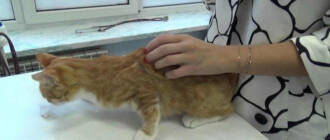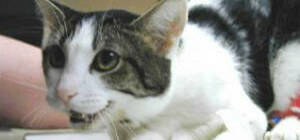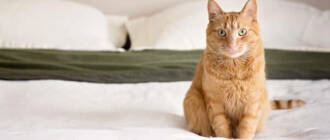Owners, alarmed by this behavior of their beloved cat, start to sound the alarm. However, not every biting of her litter by a mother cat is a signal of danger. In this article, we will try to understand when the behavior of a new mother cat is within the normal range, and when it is worth worrying about it.
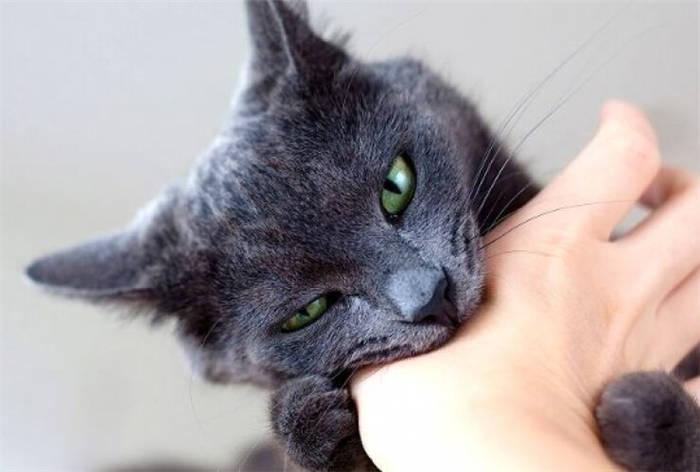
- Reasons why cats purr and bite at the same time
- 1. Your cat is overexcited.
- 2. she shows affection.
- When to expect purring and biting
- When the cat feeds kittens
- When kittens play
- A cat bites when it is excited
- Why does a cat bite a Kitten in the neck?
- Why does a cat bite her kitten's head?
- Why does a mother cat bite her baby kittens
- What a cat wants from its kittens with its bites:
- cat bites the kitten ! what does it mean ?
- Why does a cat bite its kittens?
- Illness
- Eclampsia in a cat: what are the signs and what to do?
- Behavioral signals of developing eclampsia:
- Physical signs of milk fever:
- Reasons for the cat's menacing behavior toward kittens
- Cat bites to check health conditions to identify weak kittens
- How to distinguish a sick kitten from a healthy one
Reasons why cats purr and bite at the same time
1. Your cat is overexcited.
If your cat bites you during a purring and stroking session without provocation, it may be because he is tired of being stroked.
When the cat gets overexcited, she tries to signal you to stop. She will express her displeasure with your body language. And if you continue, your furry friend will turn an affectionate bite into a real bite to prevent you from continuing the petting.
Continued petting, even when the cat signals that it wants you to stop, makes you the intruder.
It is extremely important for cat owners to learn the cat's body language to avoid frequent biting. When you pet your cat, look at her eyes and ears for signals of an impending bite. Watch for dilated eyes and flattened ears.
It is very important to respect the cat's emotional state. When she wants you to stop, you should do so, and when she is ready for more petting, she will go back for it and act as if nothing has happened.
2. she shows affection.
Love bites are the kind of bites you get during playtime. These bites are accompanied by a purr and mean that your cat is happy and content.
Cats bite their family members out of affection, and because your cat considers you a member of her family, she will playfully bite you a couple of times.
These bites usually do not tear the skin because they are friendly in nature and the cat has no intention of hurting you. Although your feline friend only wants to stroke your skin, sometimes he or she may become agitated and bite hard, tearing the skin.
Unfortunately, aggressive loving bites can develop into a bad habit. Wean your cat off such bites by stopping play and removing your hand. The cat will continue to purr and stay close to you even after you remove your hand. But she will understand that you are not happy with the bite and will refrain from taking any more bites.
When to expect purring and biting
When the cat feeds kittens
When your cat has kittens, she tends to become very caring. The cat may purr to soothe her babies when they are feeding and bite you when you get close because she is unsure of your intentions.
Cats are very protective of their babies and will attack when they feel threatened.
When kittens play
Kittens are playful and curious. Nothing is out of reach for these little balls of energy. Therefore, you can expect an unintentional severe bite as your kitten becomes more and more excited while playing.
Kittens will bite not only you, but also their siblings. This is how they test boundaries, learn social skills, and establish dominance.
The good news is that a kitten can be taught not to bite while playing while he is still small. An adult cat is much harder to teach not to bite during play than a kitten.
A cat bites when it is excited
The first thing a cat does when she feels fear, anxiety or stress is purr. Then it looks for an exit, and if there is none, it shows aggression in self-defense. Aggression comes in the form of biting, scratching and hissing.
If your cat is purring and biting while looking agitated, look for a trigger in the room or environment. Once you eliminate the trigger, your furry pal will be happy and calm again.
Remember that kittens also get scared very quickly because everything is unfamiliar to them. For example, if you bring a new kitten into the house, and there is another animal around, the kitten will purr to calm himself, and may bite or scratch you when you approach him.
Why does a cat bite a Kitten in the neck?
Please tell me!!! We have a cat (3 or 4 years old) and we decided to get another kitten (a boy), it's been 4-5 weeks, but the kitten is pouncing on the older one for no reason, but what bothers me the most is that I recently noticed the cat was biting the cat's neck, and he was not meowing and not fighting back. What could this mean?
At first there are almost always problems getting the older cat used to the newcomer. If this problem is dealt with correctly and without rushing, the situation will be resolved without problems and to everyone's satisfaction.
There are certain rules to help you adapt your new pet:
Never stick animals up each other's noses to "introduce" them to each other. This is the quickest way to get them into a conflict, which you will have to painstakingly and laboriously fix later. Stress may cause them to fight and everyone will get hurt, including you.
Separate them into different rooms, let the old-timer go for a walk. Let them make contact through a closed door for now.
If the hissing and growling stopped and the animals are curious about each other, you can let the old-timer into the territory of the newcomer. Note: It is in this order, not the other way around, that counts.
You should always be on standby, with a spray gun in your hand, if a fight breaks out, cold water is fine.
You need to talk to the older one affectionately and pet him. The fact is that he considers himself the rightful owner of you and the territory and may see the newcomer as an occupant and aggressor. Kitten may cause jealousy, so you need to show that with the arrival of the baby (newcomer) you love your first cat no less.
They will meet for a while ONLY in front of you. Don't leave them alone, no matter how well it goes. Eventually you will be able to do this, but right now it's best to take your time.
You need to gradually increase the amount of time the animals are with each other and be ready at all times if a tense situation arises. Only patience and love.
Why does a cat bite her kitten's head?
We had a cat not too long ago. She gave birth to four (kittens). Now they are almost 3 weeks old. The kittens and the cat sleep in the closet, they have room there. 3 kittens constantly all drink and the other is weak all the time beeping, looking for his mother they (kittens) do not give milk constantly pushing him away from himself. When the kittens fell asleep I decided to take the one that he would drink milk. Well, I let him drink milk, but then the mother cat began to bite his head and did not let go and I was not with them at the time may be that there is a kitten mother cat hurt? I tried to separate them, but she would not let me. What to do?
That's the way it is in the animal kingdom. The mother may kill the weakest so she won't suffer. If you want it to survive, take it away from the cat and feed it from a pacifier.
You've got it all wrong. Mama cat knows what she's doing. Maybe she senses he's doomed or something. She'll figure it out!
Feed the kitten yourself! 3 weeks – you can already accustom him to the saucer. Animals don't raise weak cubs. It is a natural selection in nature.
Maybe because you took and fed the kitten, it smells foreign to the cat, and it no longer recognizes it as its own. Try feeding it yourself.
Why does a mother cat bite her baby kittens
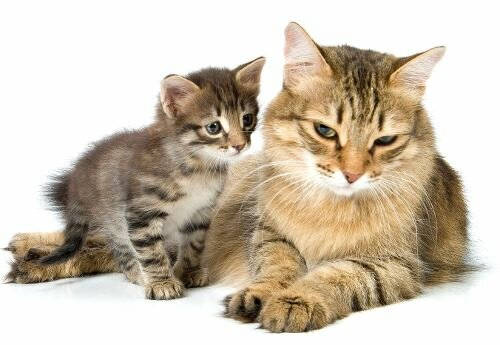
07.09.2016 Parturition is a great stress for a cat, which has a significant impact on its psychological state and subsequent behavior, which is reflected, among other things, on its newborn offspring. It is not unusual for cat owners to observe that after calving their very affectionate cat starts dragging her babies by the crest, kicking and biting them, despite their squealing. But this change in the cat's behavior should not cause people's bewilderment, because it is quite natural and is caused by many natural reasons, not aggressive at all.
What a cat wants from its kittens with its bites:
- It is the cat's way of educating them. Kittens grow up very fast. In this short time, their mother cat has to teach them everything she knows and can do to help them survive (if the cat and kittens are homeless). Biting the kittens is one of the methods of education. Kittens, like children, can be distracted, naughty, etc. Nibbling attracts their attention without hurting them or leaving teeth marks on the cat's skin. If the desired effect is not achieved, the cat bites its careless child more tangibly. The kitten signals by its cry that it has finally got it,
- so the cat protects them from impending danger. By biting the kitten's withers, the cat warns the baby from the approaching dog, for example, or does not let it onto the balcony, from which the kitten might fall out,
- The cat bite is used as a punishment for bad behavior. Imagine that she is tired and wants to take a nap, and the restless kitten wants to keep playing. When she bites a fussy baby, she quickly calms it down and puts all its fervor to rest,
- by grabbing a kitten by the scruff of the neck, the cat carries it from place to place until it learns to move on its own,
- with the help of bites, the cat trains its cubs in the art of hunting. This is how it teaches them the technique of grasping a mouse or bird and how to transport their prey to the right place. If you watch the kittens closely, they begin to practice these skills on each other and quickly learn them,
- Some especially clever cats teach their young toilets by biting,
- biting the mother cat stimulates the kittens' motor activity, makes them play and tests the reflexes of her cubs.
A cat biting her kittens as an act of aggression is a very rare occurrence. As a rule, there must be a good reason for it. This aggression towards its offspring is accompanied by other outward signs – threatening glare, hissing, kicking with its paws.
cat bites the kitten ! what does it mean ?
the kitten is 4 days old, she bites it, like the traces are not, but it bites hard, because, he (kitten) meows, you can tell, raving.
usually bites the neck and head.
Once I took him out of the crib and often goes out of there. Maybe she does not accept it? Although all the past 4 days went like clockwork, the kitten is alive and healthy, she fed him, laying next to him all the time!
What can it be? It's just the first time the cat pooed, I'm not experienced in these matters) I'm afraid!
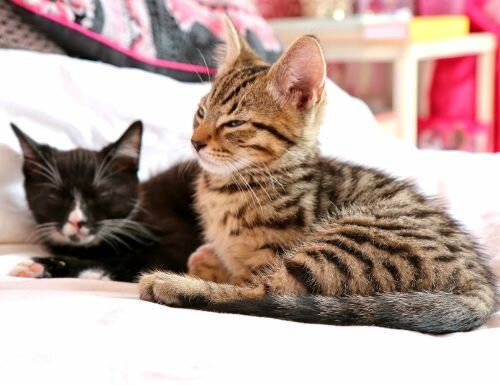
She doesn't like the cot. Hide it somewhere where the cat will feel more comfortable.
And from now on, know that biting the neck or head is the way to carry the kitty somewhere else.
If even after hiding the cot, she will drag him, then stop the whole family kitten squeeze.
dac and they bite kittens (like play) really my friend's cat bit the head off a kitten and ate her brains (((
Immediately to the pharmacy for calcium glucanate!
90% sure it's eclampsia.
Signs of eclampsia in a cat:
– Cat is breathing "doggy style", i.e. with its mouth open and its tongue stuck out as if it were hot
– The cat is restless and often gets in and out of the box so the kittens can't really suckle
– Cat is throwing some of the kittens out of the box
– The cat grabs the kittens (often not gently at all) and drags them from place to place.
Be vigilant! Eclampsia develops gradually and the longer you do nothing, the harder the consequences will be, the harder it will be to stop the attack.
Treatment of eclampsia in cats. Remember, the only possible treatment for eclampsia is injections of Calcium Gluconate (about the drug).
The injections are given intramuscularly at different points. For preventive purposes, 1 ml a day or 2 ml in the morning and evening is enough. If the cat has the symptoms described above, i.e. an attack has started, this amount will not be enough! You don't need to inject it just to make a mark, but to cure the cat. You start with a dose of 2.5 ml and wait for 30-40 minutes. It did not help? Repeat the injection and wait again. The final dose of the administered medicine can be up to 10 ml (i.e. four injections within 3 hours).
Why does a cat bite its kittens?
It happens that the idyll of the "cat family" is broken by the mother cat – unexpectedly for the owners, she begins to bite and chew on her own kittens. Sometimes, if not intervened in time, the cat can ruin the whole litter. So why does a cat chew on its own kittens? It is usually due to the reasons outlined below:
1. If kittens are more than 4 weeks old, their teeth have grown and their claws have become sharp, they are painful for the cat when feeding and she may bite them.
2. If a cat is sick after a hard labor, it may get rid of the kittens this way.
3. some cats play with kittens very energetically and quite aggressively.
4. The cat has eclampsia (lack of calcium in the body) and needs urgent help.
5. The cat is in heat and is trying to get rid of the kittens with aggression.
6. The cat is young and has a weak maternal instinct.
7. The cat is not happy with the "nest" or its location (e.g., it is too noisy, hot or cold).
8. The cat is nervous (e.g., children constantly dragging kittens around, other animals trying to meet or care for kittens, etc.).
9. The kittens are not viable or have a congenital genetic defect.
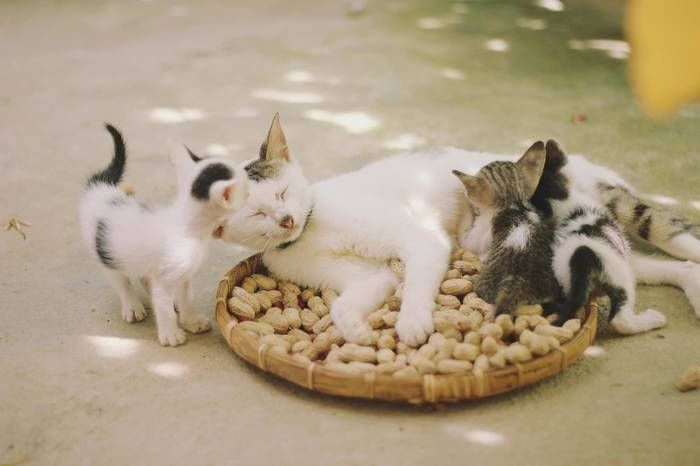
If the cat injures the kittensIf the kittens are older than one month of age, they should be removed and fed artificially.
If the kittens are more than one month oldIf the kittens are older than one month, the cat should have a separate sleeping place from the kittens where she can rest and lick the scratches caused by the kittens.
If a cat shows signs of eclampsia – Muscle twitching, loss of coordination, vomiting, cramps, body tremors, copious salivation, lethargy, weakness of hind limbs, "dog" breathing – then the cat should make intramuscular injections of calcium gluconate.
Illness
There are cases when the pet suddenly begins to show excessive aggression towards its own babies, as well as towards its owners. It is not uncommon for cats to develop eclampsia after giving birth, and this may be the reason for the sudden hostility.
Eclampsia is a condition that should only be diagnosed by a specialist. It is not recommended to diagnose yourself, because the cause of aggressive behavior can be elementary fatigue or pain in the mammary glands (mastopathy). And yet, given that this disease is quite common, let's talk about it in more detail.
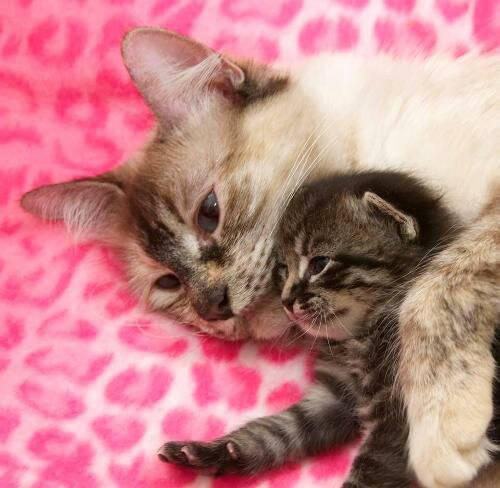
Eclampsia in a cat: what are the signs and what to do?
Eclampsia (aka milk fever) provokes hypocalcemia – disorder of calcium metabolism in the body, in which it begins disastrously lacking. Milk fever usually develops in the first 2-3 weeks after calving. This is due to the active washout of calcium from the blood, due to the fact that it is involved in the formation of milk. It is most common in multiple mothers.
Behavioral signals of developing eclampsia:
- Increased excitability and restlessness or lethargy and complete apathy;
- Aggression accompanied by failure to recognize the offspring and hosts;
- Refusal to sit with their own kittens;
- Avoidance of litter feeding and biting, leaving marks on their pelts;
- Frequent carrying of the babies from place to place.
Physical signs of milk fever:
- A pointed muzzle with stretched skin and bared fangs;
- Rapid breathing;
- Pale mucous membranes;
- Movement becomes abrupt;
- The animal can hardly move its hind legs "stiffened" due to muscle spasm;
- Cramps (intensity depends on the severity of the disease);
- Increased body temperature;
- Shivering;
- The pet often falls sideways;
- Uncontrolled salivation appears.
A cat with eclampsia has a fever of up to +41 °C. Carbon dioxide accumulates in the body, and the animal has difficulty breathing. The blood pH rises and calcium levels drop.
Milk fever is not as dangerous to others as it is to the sick pet. If not treated in time, death from hyperthermia – due to depressed breathing and brain damage – will occur 12 hours after the onset of the attack.
If your pet has an acute eclampsia attack, call the vet immediately. Sometimes time runs out in minutes, especially when an attack is not detected immediately, the doctor may simply not have time. This is when, while waiting for the doctor, you will need to give your pet first aid yourself.
Reasons for the cat's menacing behavior toward kittens
If you think that by growling at the offspring, the cat is showing aggression, this is not the case. There are several reasons for a cat hissing and growling at its babies.
A cat tells its babies to be quiet with a quiet hiss when someone else passes near it: a person, a dog, a cat.
It's the same thing if we pressed our finger to our lips and said, "Shhhh!"
The cat must prepare the little ones for life among strangers. Kittens get their hissing and growling skills from their mother.
Sometimes you can observe that after the mother hisses, the kitten immediately starts growling at her with her ears pressed tightly against her head. So, the lesson has been learned.
It is not for nothing that breeders try not to hold newborn kittens in their hands. Human scent will quickly transfer to the kitten, and the mother can "reject" the baby by weaning it from the pacifier.
If there is a weakened kitten in the litter who cannot fight for a place at the mother's nipple with her stronger siblings, the cat may hiss at such a weak kitten, dismissing her.
She understands that even strong kittens lack resources, so she will not waste them on a weakling.
If no human intervenes and does not feed the rejected baby from the pacifier, the cub will die.
They say of such a one: not alive. Yes, such cruelty is inherent in animals.
When kittens reach the age of 2 or 3 months, the cat begins to deny them milk.
Especially since the babies have already grown teeth and can eat solid food. Often they bite the cat's nipples because their gums itch.
This is the signal for the mother to refuse to feed. Oh, and the cat's strength is already depleted. It needs to recover for the next offspring.
It is not typical for cats to care and worry about their babies until old age. Purrs will quickly dismiss teenage kittens with hisses, growls, or even a slap. Now, it's every man for himself.
Cat bites to check health conditions to identify weak kittens
Noticing a pet biting her kittens can bring to mind the law of nature, which says that the strongest survive. Often a cat bites kittens not only for educational purposes, but also to identify babies with congenital abnormalities. Animals are aggressive toward such individuals.
Survival instinct does not allow the cat to leave a sick kitten, it will probably give it up. She identifies sick kittens by biting each one and watching for reactions. Be careful if any kitten is left unattended or if you notice obvious aggression towards it from the mother. She will probably want to get rid of the sick one. Show it to the veterinarian, perhaps not all is lost and after treatment the cat will accept the baby again.
How to distinguish a sick kitten from a healthy one
Take each kitten in your arms and examine it carefully, it's quite easy to tell an unhealthy one apart. Healthy Kitten.:
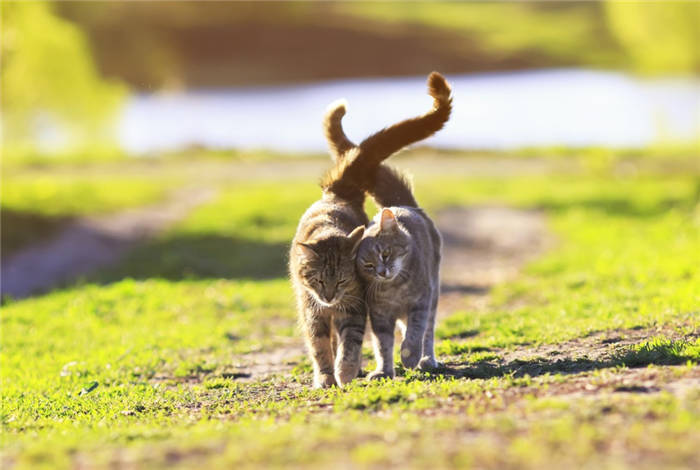
Kittens may all be healthy, but the cat bites one or more aggressively. She may be low on milk and this is her way of feeding at least some of her offspring. Then the care of the younger generation should fall on the owner. It remains to feed the babies with milk from an eyedropper or syringe without a needle.
It is not always necessary to sound the alarm when cats bite. If they do not harm the kittens, it may be just a learning curve. Serious behavioral abnormalities require observation and consultation with a veterinarian. Aggression when she bites kittens is unacceptable. Show more attention if the cat is a first time mother, help her through the stress, and she will become caring, attentive to her babies.



